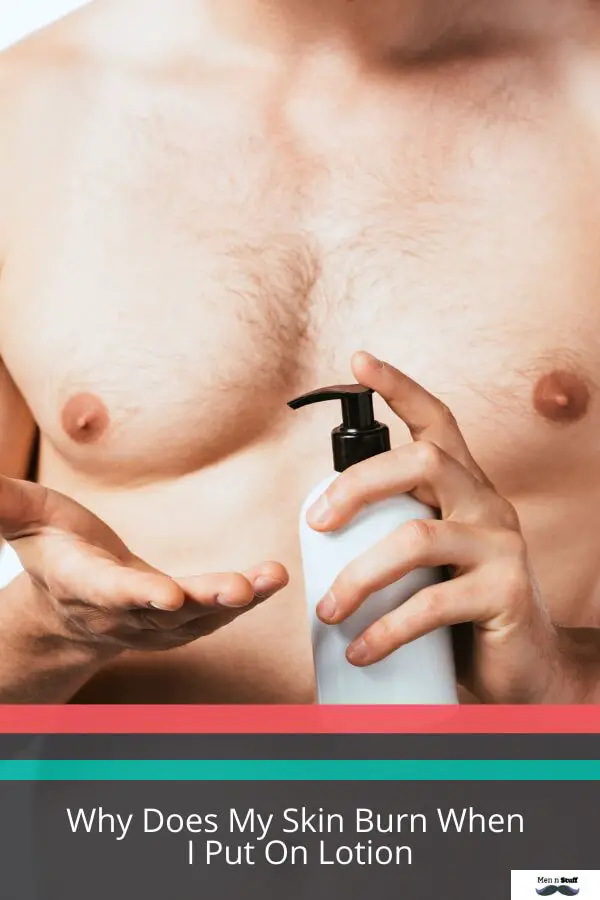A burning sensation after applying lotion can result from various factors, including allergic reactions, alcohol content (commonly found in lotions), or skin conditions. According to a study published in the Journal of the American Academy of Dermatology, 10% of people experience skin irritation from lotions.

Causes Of Burn Sensation After Applying Lotion
A research study of 2011 published in the “International Journal of Dermatology” was done by surveying a few people in the United States. The survey indicated that over 44% of surveyed people had extremely sensitive or sensitive skin.
These people often had a complaint of burning, stinging, or itching sensation when they used lotion. When the skin burns after you put on cream, it is pain receptors or nociceptors that indicate irritation or potential harm to the skin.
Besides, the inflammation that accompanies the irritation indicates that the lotion disrupts the skin barrier, i.e., the epidermis’s outermost layer. This layer protects the skin from fungi, bacteria, and various harmful microorganisms.
The following causes result in uncomfortable feelings on the skin:
Poor Skin Barrier
The skin barrier is the outermost layer of the skin, which is a few micrometers thick (smaller than a hair’s width). This layer is made of natural lipids, dead cells, and protein. It causes a burning sensation and stinging.
A functional and intact skin barrier slows down water loss, prevents allergens and irritants from entering the skin, and maintains your skin’s functional and protective integrity, giving you moist, smooth, healthy, and glowing skin.
Numerous causes weaken and result in weak or low skin barrier are the following:
1. Internal Causes: The ability to synthesize lipids and natural oils is decreased due to age. These oils and lipids are the strength to hold protein and skin cells together. Besides, the skin becomes naturally flaky and dry.
2. External Causes: Washing with harsh chemicals and hot water excessively. It decreases the natural lipids of the skin. Besides, pollution, sunburn, skin disorders like eczema break the skin.
Hence, when the outer layer or your skin barrier is poor and weak, chemicals, irritants, allergens, viruses, and bacterias penetrate and access the skin. It then results in irritation and inflammation, resulting in a burning sensation, stinging skin redness skin after applying lotion.
Ingredients Of Lotion.
The primary ingredients in the lotion that trigger skin burn and stinging are mentioned in the following table:
| Sl. No. | Causes | Uses | Sife Effects |
| 1 | AHA and BHA(Alpha and Beta Hydroxy Acid) | -Makes skin soft and smooth-Treat unwanted blemishes and acne-Anti-aging benefits | -Have low pH-Burning-Singing-Dissolve lipids and oils and make skin barrier weak |
| 2 | Alcohol | -Act as a preservative in the skincare products-Change the formulation’s texture | -Decreases natural lipids-Make skin barrier weak-Burning-Stinging |
| 3 | Fragrance | -These are the artificial fragrances or aromas derived from chemicals | -Burning sensation-Stinging |
| 4 | Preservatives(Parabens, Diazolidinyl, Formaldehyde, Methylisothiazolinone, and Imidazolyl urea) | -Prevent the growth of fungus, yeast, or bacteria in skincare products.-Lotions containing water need preservatives. | -Allergy-Irritation |
| 5 | Surfactants and Emulsifiers | -Needed to hold oil and water together in the lotions or other skincare products. | -Irritation-Stinging |
Therefore, if your skin is sensitive, you need to be careful about using the lotions that have the ingredients mentioned above.
Does Your Skin Need Time To Adjust With The Lotion?
Some people assume that the lotion is affecting positively when their skin burns. However, if the cream is new to your routine, your skin might need some time to adjust to the lotion. Following the below-mentioned steps will help you find out if you need to continue with the lotion or not:
1. Apply a single layer of lotion to your skin for one to two days.
2. Reduce the frequency of lotion application.
3. If the burning or intensity of burning decreases with each application, it indicates your skin is adjusting to the lotion.
In the case of continuous burning, you need to stop using the product and try another one.
Hence, in some cases, your skin needs time to adapt to the lotion, while for others, the product is not compatible with the skin type.
Are You Allergic To The Lotion?
It is recommended to speak to a dermatologist if you notice the following reactions on your skin: burning is intensifying after each application on your skin,
1. Intensified burning
2. Skin rash
3. Irritation
When your skin has inflammation, it is more sensitive to allergens. The skin’s reaction occurs within twelve to seventy-two if your skin is allergic to the lotion’s ingredient.
A little bit of skin burn may be expected. However, if the issues are persistent and increasing, you need to discontinue the lotion and contact a dermatologist.
Soothing A Burning Sensation
There are many ingredients and herbal skincare products that can soothe the burning sensation. Some of the common elements that will calm the uncomfortable feelings on the skin are the following:
1. Beeswax: It has anti-bacterial, anti-viral, and anti-inflammatory properties. It also provides superior moisturizing properties. Natural beeswax prevents the process of breaking down the skin barriers and provides increased occlusive functions of the skin barrier.
2. Ceramides: They are the necessary lipids to form the skin barrier. A healthy skin barrier is the precise ratio of cholesterols and ceramides. Low ceramide concentration causes irritation and dryness in the skin.
3. Licorice Root: It is the most effective and versatile skincare ingredient. It is also a natural and herbal ingredient widely used in Asia as a dietary and medicinal skincare ingredient. Moreover, it has excellent anti-inflammatory properties to surge the skin barrier.
4. Natural Oils: These oils do not contain emulsifiers and surfactants that irritate the skin. Crude oils with herbal ingredients boost moisturization and hydration, strengthening and rebuilding the skin barrier. Besides, it makes skin more tolerable to skincare products that cause burning and stinging.
5. Shea Butter: It is obtained from the Shea tree is used as an anti-wrinkle, and is useful for dark spots, dryness, and stretch marks. It strengthens skin the barrier by supporting skin elasticity and provides affluent cholesterol.
6. Conclusion: Many people experience skin burns after applying lotion to their skin. It can be due to your weak skin barrier or skin sensitivity. Hence, it is useful to apply a lotion to a little area before taking it into your daily routine. In case of a burning sensation, you can use herbal ingredients to soothe your skin. Besides, it will strengthen your skin barrier and help to make your skin tolerant of skincare products.
How to Stop the Burning Sensation When Using Lotion
Experiencing a burning sensation while using lotion can be a result of several factors, such as a sudden allergic reaction, sensitive skin, or simply a wrong product choice. To alleviate this discomfort, there are several actions one can take:
1. Stop Using the Lotion Immediately
As soon as a burning sensation is felt, stop using the product immediately to avoid further skin irritation. Rinse off any remnants of the lotion if possible.
2. Identify the Potential Irritant
Examine the lotion’s ingredients list closely. Look out for potential irritants like artificial fragrances, alcohols, and preservatives which may consist of parabens and sulfates. These are commonly found in lotions and can irritate sensitive skin.
3. Opt for Hypoallergenic Products
Choosing hypoallergenic products may reduce the chances of developing an adverse reaction. These products are specifically designed to minimize allergenic reactions.
4. Patch Test New Products
Before applying a new lotion all over the body, it would be wise to conduct a patch test first. Apply a small amount on the inner arm and wait for 24 to 48 hours. If no adverse reaction occurs, it is generally safe to use.
5. Consult a Dermatologist
If after changing lotions the burning sensation persists, then it’s advisable to consult a dermatologist. This medical expert can help identify the underlying cause, whether it is an allergic reaction or a skin condition.
6. Use Products with Soothing Ingredients
Lotions made with soothing ingredients like aloe vera, tea tree, chamomile, and cucumber can alleviate skin burning or irritation.
7. Hydrate and Maintain a Healthy Diet
Keeping the body hydrated and maintaining a balanced diet rich in vitamins and minerals helps foster healthier skin. Healthier skin tends to be less sensitive to certain products.
8. Protect Skin from Sun Exposure
Excessive sun exposure can cause skin to become more sensitive. Using sun-blocking lotions or creams may help.
9. Use Fragrance-Free Products
Some people might be sensitive to fragrances, even if they are not aware of it. Opt for fragrance-free products if you tend to have sensitive skin.
| Tips | Description |
|---|---|
| 1. Stop Using the Lotion Immediately | Prevent further skin irritation |
| 2. Identify the Irritant | Understand the cause of the problem |
| 3. Hypoallergenic Products | Minimize allergenic reaction |
| 4. Patch Test | Test the safety of the product |
| 5. Consult a Dermatologist | Seek professional advice |
| 6. Soothing Ingredients | Alleviate skin irritation |
| 7. Hydrate and Healthy Diet | Supports skin health |
| 8. Protect from Sun Exposure | Prevents skin sensitivity |
| 9. Fragrance-Free Products | Suitable for sensitive skin |
Following these steps can considerably minimize or completely eliminate the burning sensation when using lotion, leading to a more comfortable and soothing skincare routine.
FAQs
1.Why Does My Skin Burn When I Put On Lotion?
2. What happens when the skin barrier is weak?
3. What Are The Main Ingredients In The Lotion That Can Trigger Irritation And Burning Sensation?
References:
https://www.nulookmedspa.com/blog-why-does-my-skin-burn-after-applying-lotion-2598
https://www.glovesinabottle.com/blogs/news/why-does-a-moisturizer-sting

